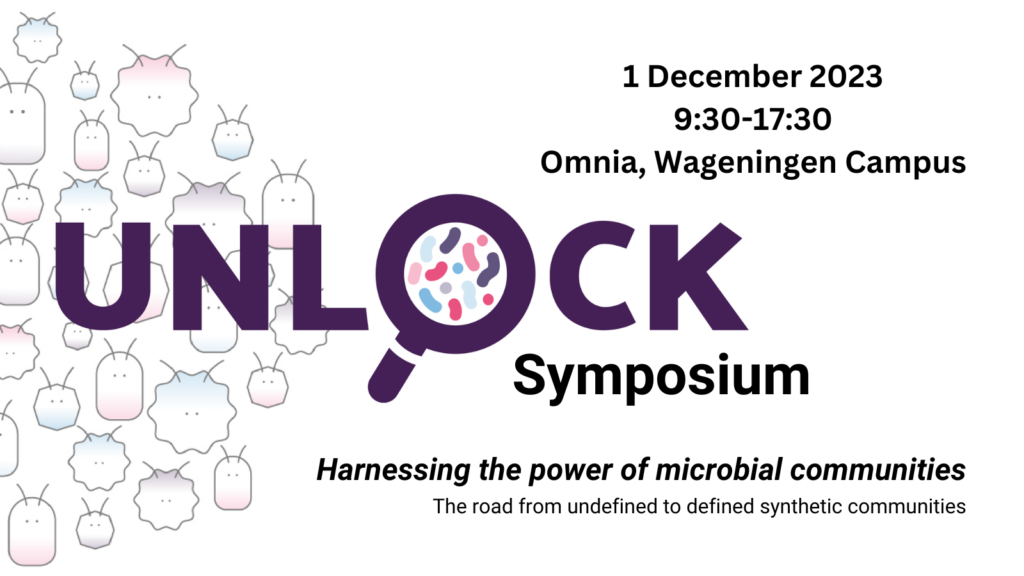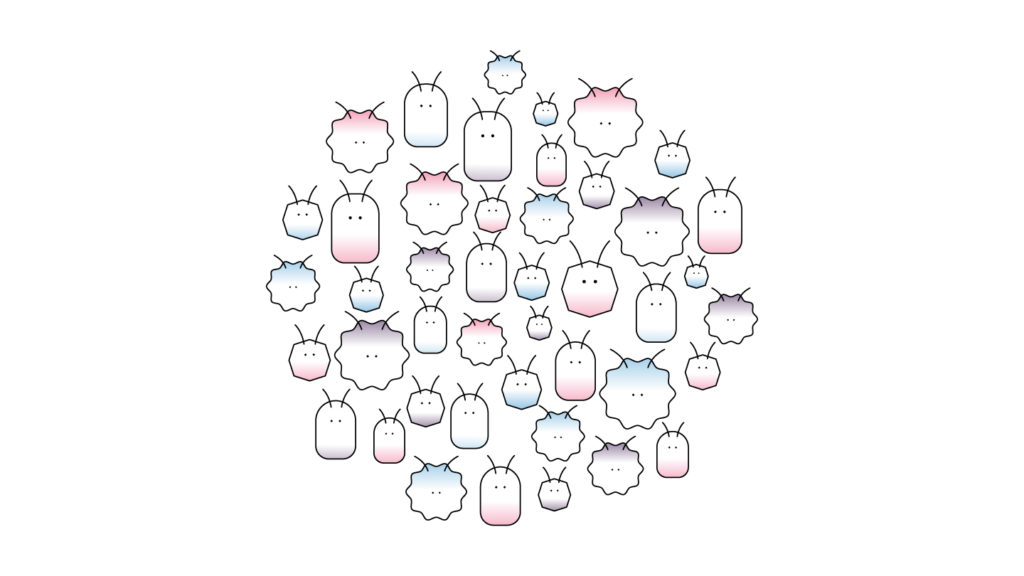
We are thrilled to invite you to the first UNLOCK symposium. Themed “Harnessing the power of microbial communities: the road from undefined to defined synthetic communities”, it promises to be an exceptional gathering of brilliant minds in the field of microbiome research.
The symposium will feature keynotes from renowned experts in the field, shedding light on the latest discoveries and emerging trends in microbiome research. Additionally, attendees will have the opportunity to participate in thought-provoking workshops, engage in lively discussions, and expand their professional network.
- Date: 1 December 2023
- Time: 9:30 - 17:30
- Wageningen University & Research, Omnia building, Hoge Steeg 2, 6708PH Wageningen, the Netherlands
Registration for the UNLOCK Symposium is now closed.
For any questions, please feel free to reach out via email: contact.unlock@wur.nl
ProgramME
9:30 – Doors open & registration
10:00 – Welcome – Prof. dr. Hauke Smidt (UNLOCK Facility Coordinator)
10:15 – Keynote – Synthetic Communities – Prof. dr. Diana Machado de Sousa (30 min)
10:45 – Coffee break
11:00 – Keynote – Modeling: in Search of Unifying Concepts – Prof. dr. Frank Bruggeman (30 min)
11:30 – Keynote – Microbial Ecology Research – Prof. dr. James Prosser (30 min)
12:00 – Intro to afternoon programme
12:10 – Lunch and poster presentations
13:00 – Workshops*, round 1 (50 min)
14:00 – Workshops*, round 2 (50 min)
15:00 – Coffee break
15:15 – Plenary session wrap-up discussion and Q&A (45 min)
16:00 – Drinks, bites, and networking
KEYNOTE DESCRIPTIONS AND Speaker bios
Keynote description
Title: Principles of microbial physiology in the context of microbial communities
“We have nowadays a comprehensive understanding of the microbial physiology of model microorganisms. For instance, current genome-scale stoichiometric models integrate transcriptomics, proteomics and fluxomics data and rely on metabolic reactions’ basic principles. This resulted from the quantitative nature of classical microbial physiology and microbial systems biology, bridging the gap between genotype and phenotype in the last two decades. But does this understanding bring us any closer to understanding microbial communities? Are the physiological principles — obtained with model microorganisms, studied in idealised, controlled environments — useful when answering questions about microbial communities? Or can basic principles such as fitness maximisation, thermodynamics, and chemical-element conservation also provide predictive models and principles of microbial communities? What can be UNLOCK’s role in this search for logic and structure in microbial communities? I will touch upon these topics and will motivate the need of a quantitative microbial ecology.”
Bio
Prof. Dr. Frank Bruggeman, the University Research Chair in Interdisciplinary Life Sciences at VU University of Amsterdam, obtained his PhD in 2005 for his systems biology research in mathematical modeling of signaling and metabolic networks. With a strong conceptual and mathematical focus, his work encompasses isogenic single-cell heterogeneity, genome-scale stoichiometric modeling, dynamic modeling, and fitness-maximization principles in microbial physiology. His research, driven by fundamental (micro)biological questions, often contains experimentation, including basic microbial physiology and scientific software development. Currently, he’s engaged in predictive principles of microbial physiology and expanding into microbial communities.
Keynote description
Title: UNLOCKing a greener future: Synthetic microbial co-cultures turn carbon-waste into valuable chemicals
“Carbon-containing wastes, like recalcitrant wastes and biomass, can be converted to CO-rich syngas via gasification. Syngas fermentation is a pathway to produce valuable chemicals, including ethanol, currently in full-scale production. While past research has mainly focused on acetogens’ genetic engineering, our group innovatively designs and applies synthetic microbial co-cultures for syngas fermentation. We’ve demonstrated this with a Clostridial co-culture that converts syngas into medium-chain fatty acids and elongated alcohols. Currently, we’re combining non-sulfur purple bacteria with acetogens to produce bioplastic precursors, known as polyhydroxyalkonates. In my keynote, I’ll discuss these topics, highlighting recent results in converting CO into bioplastic precursors.”
Bio
Diana Z. Sousa, a professor at Wageningen University & Research, leads the Microbial Physiology group within the Laboratory of Microbiology. Her research focuses on anaerobic conversion of one-carbon molecules (e.g., CO, CO2, methane, and methanol) and their application for chemical production. An example is her research on the design and development of synthetic co-cultures for the conversion of syngas (produced from wastes or lignocellulosic materials) to medium-chain fatty acids, alcohols and other low solubility added-value products. Diana studied Biological Engineering at the University of Minho and later earned her PhD there. Prior to her current position, she worked as an Assistant Professor in Environmental Biotechnology. Her goal is to understand microbial communities and interactions for biotechnological applications in a circular economy.
Keynote description
Title: Scientific vs. technical challenges in microbial ecology: which drives which?
“Microbial ecology is often associated with a heavy reliance on techniques, particularly in data collection and analysis. Molecular and omics-based studies of microbial communities provide examples of this situation, although not exclusively. It might be more accurate, if controversial, to suggest, that it’s the microbial ecologists, not the discipline itself, who are driven by techniques. Furthermore, there’s a substantial investment in method development, but less emphasis on prioritizing important scientific questions, understanding unexplained ecological phenomena, and developing and testing hypotheses for significant scientific advancements. This presentation will consider possible reasons for this situation and will argue that microbial ecology is limited by a lack of scientific questions and hypotheses that should drive experimental work.”
Bio
Jim Prosser is an Emeritus Professor in Environmental Microbiology at the University of Aberdeen. With a BSc in Microbiology by Queen Elizabeth College, University of London and a PhD from the University of Liverpool, his research focuses on the ecophysiology, diversity and ecosystem function of soil microorganisms, with particular emphasis on ammonia oxidisers, which play a central in the global nitrogen cycle. He has made significant contributions in pH and ammonia supply on ammonia oxidiser communities, the influence of community composition on ecosystem function, including nitrous oxide emissions, and the global implications for nitrogen fertiliser strategies. He is a Fellow of the Royal Society, the Royal Society of Edinburgh, the Royal Society of Biology and the American Academy of Microbiology. He was awarded an OBE for services to Environmental Science in 2013, has an Honorary Degree from the University of Ljubljana and is a CAS Distinguished International Professor.
WORKSHOPS
FAIR end-to-end data management
The use of high throughput ‘omics technologies has significantly enhanced our ability to investigate intricate microbial communities at the molecular level. For data reuse, the FAIRification of these extensive data sets is often viewed as an administrative process that typically comes after data analysis. However, there is no strict requirement for these steps to follow a specific order. The way raw data is processed and analysed depends largely on the research design and conditions applied. It is crucial to seamlessly integrate wet lab experiments with computational investigations in the research and development process. Workflows managed through metadata can help avoid unnecessary data manipulation, while provenance registration provides a clear record of the complex steps used for data transformation and analysis. By combining FAIR principles with provenance registration, we not only enhance the reusability of ‘omics datasets but also promote transparency and reproducibility of our findings. Want to know more? Join this workshop.
Undefined vs. defined (synthetic) cultures: what’s the way forward?
Undefined microbial cultures consist of communities of microorganisms that interact with each other without a well-defined composition. They interact naturally, so we cannot easily predict the interactions between the various microorganisms. Defined or synthetic microbial cultures consist of known microbial species, and controlled, undefined consortia consist of a diverse array of microorganisms. Defined microbial consortia refer to controlled and intentionally assembled communities of microorganisms, that are selected based on specific criteria and known compositions. They are designed to mimic certain ecological interactions, functions, or behaviour observed in natural microbial communities. Should we aim to use undefined cultures in our bioprocesses or is the use of synthetic or defined cultures the way forward? Are synthetic cultures feasible, e.g., do we have enough species/strains in our culture collections that can do the job?
How to get from a research question to experimental design?
Experimental (and modelling) tools available for investigating microbial communities in natural and man-made environments is enormous, and expanding rapidly. The amount of data is growing especially fast in the field of molecular analysis of microbial communities (meta-omics). Computational tools to deal with all these data – such as the establishment of genome based (stoichiometric) models – are developing rapidly. Limitations lie in resolving the quantitative physiological properties of microbial communities as reflected in the catalysed conversions and exchanged metabolites. This leads us to the question how we can design experiments in a rational manner to align research questions with adequate use of the available tools. What do we need to decipher the roles of different types of microorganisms in microbial communities? In this workshop we aim to discuss how microbial ecology research may facilitate the scientific discovery of principles that determine microbial ecosystem properties and the role of microbial players in the investigated system.
Communities as collections of single strains and cells
Different microbial taxa play important roles in various functions within microbial communities. With the advent of an increase of physiological and genomic information, we can predict and assign specific functions and interactions. However, it has been shown that there can be large differences in genomic and derived functional properties between different strains within a species. Also, a considerable strain-level diversity exists within a given environment (e.g., an individual’s intestinal tract) and between similar environments (intestinal tracts of different individuals). On top of that, cell-to-cell heterogeneity in behaviour within the same environment – even within individual cultures – contributes to the behaviour of a microbial community. Do we sufficiently take into account this strain- and cell-level heterogeneity in functional potential and activity? Do we currently have the right tools and concepts to do so? And what about strain-level heterogeneity when considering the design of synthetic communities?
Matching future research directions & tool developments
In today’s rapidly evolving landscape of microbial research, it is imperative to harmonise our methodologies and tools with emerging technologies and concepts. The convergence of technological advancements and the progress in high-performance computing holds the potential to conduct the development of cutting-edge research tools. Specifically, artificial intelligence (AI) and high-performance computing are poised to revolutionise data analysis, shedding light on intricate microbial interactions. Additionally, the blend of diverse modelling approaches offers the opportunity to extrapolate and forecast the dynamics of microbial communities under operational and environmental conditions yet to be experimentally explored. What state-of-the-art tools and technologies are currently accessible for microbiological research? How have these tools contributed to advancing our comprehension of microbial systems? What obstacles and impediments hinder the adoption of novel tools and research trajectories in the dimension of microbiology, and how can these obstacles be overcome? In the context of this workshop, our primary objective is to explore and align the evolving research needs with the development of innovative tools and technologies.

Registration for the UNLOCK Symposium is now closed.
For any questions, please feel free to reach out via email: contact.unlock@wur.nl
*The afternoon programme contains two rounds of interactive workshops. Please rank the workshops in order of your preference in the registration form. Each workshop has limited capacity. We will try to accommodate your preferences as much as possible.
The programme may be subject to small changes.
